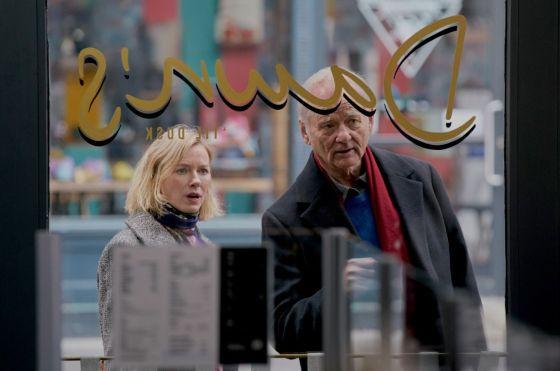

[Rating: Solid Rock Fist Up]
In Theaters Friday, April 4
Napoleon once remarked on a scene after one of his battles, speaking about a fallen soldier whose dog wailed in sorrow over the corpse of its master. “He lay there deserted by all except his dog. I looked on, unmoved, at battles which decided the future of nations. Tearless, I had given orders which brought death to thousands. Yet here I was stirred, profoundly stirred, stirred to tears. And by what? By the grief of one dog.”
Grief comes at people from weird directions, and not necessarily when/where one might expect. Whether it’s a general on the battlefield or a 21st century intellectual in Manhattan, people don’t follow a preordained path towards acceptance and closure, and God help them if an animal is involved.
The Friend is an exploration of this concept, though like grief, its path is predictable yet not at all straightforward. After a cold-open prelude, the film opens at the memorial service for Walter (Bill Murray), a writer/professor whose legacy of womanizing is well represented by the guests. These mourners include ex-wives Elaine (Carla Gugino) and Tuesday (Constance Wu), current wife/widow, Barbara (Noma Dumezweni), Walter’s adult lovechild, Val (Sarah Pidgeon), and ex-lover/confidant, Iris (Naomi Watts). Considering all these connections, it comes as quite the shock when Iris learns that Walter bequeathed his 150-lb Great Dane, Apollo (Bing), to her.
Nothing about The Friend and its narrative trajectory is unexpected or surprising, as Iris protests Apollo’s placement, suffers through new-dog-owner growing pains, then grows to tolerate and eventually love the big brute. Those who lived through 1989 and the K-9/Turner and Hooch man-dog Odd Couple era recognize the formula, and that’s just what directors Scott McGehee and David Siegel are tinkering with, here. The pair transcend the mundane with The Friend, however, and carve out a unique path for this story and its broader themes about loss, friendship, grief, and love.

McGehee and Siegel adapted the story from the novel by Sigrid Nunez, and like their 2013 film, What Maisie Knew (also an adaptation), they find a way to reexamine a seemingly normal, core experience from a unique direction. Iris’ journey as Apollo’s new mom gives her access to a grieving partner that will listen but never blame: that will know but never question. The dog’s sad eyes and compulsive need to lay on Walter’s old shirt force Iris to confront the pain of her friend’s passing while also pushing her outside of a comfort zone that seems to have kept the creative writing teacher mired on the proverbial sidelines.
Like grief, the 150-lb Apollo isn’t something that can just be tucked away and ignored while Iris gets on with her life. The big bastard destroys the apartment if left alone too long, he violates the bylaws of Iris’ building, and serves as a connection to a world (Walter’s) she has worked hard to escape. How Iris tackles both the grief of Walter’s loss as well as the outward labors associated with that fallout (Apollo) find harmony with each other in the second and third acts, and are a credit to Watts’ work in the lead, here.

And while Bing is maybe the best working dog actor this side of Anatomy of a Fall, Watts is the big standout of The Friend. As Iris, she finds a way to modulate a fatigued, raw sort of personal/professional burnout against encroaching grief that threatens to subsume all other emotions. What’s more, the character doesn’t fall into any trope conventions that paint her with broad strokes, existing as middle-aged, female, and single while not making this the anchor of her arc or resolution. Although Apollo is an important part of her journey throughout the story and is indeed a catalyst for growth, Iris’ story is her own, and she doesn’t need a (human) partner to “save” her.
There’s a blameless innocence that coexists with conscious love behind the eyes of most dogs, and McGehee and Siegel wield it like a scalpel, here. Murray’s presence as Walter, the one-time raconteur who struggled to find a place in the post-#MeToo world is also a clever touch, and adds a meta layer to the character that makes him instantly knowable and enriches the material. The directors also make great use of Manhattan as a setting, establishing the claustrophobia of one-bedroom, 500-square foot living amidst the wealthy trappings of the West Village.
An odd couple dramedy with a strong thematic backbone rooted in explorations of grief and acceptance, The Friend creeps up on a viewer, much like the sadness that follows a terrible loss. Bolstered in no small part by a commanding yet subtle turn from Watts in the lead, and an all-time animal performance from Bing, the film by McGehee and Siegel is yet another triumph from the filmmaking pair. At a full 120 minutes, it feels like it might have enjoyed a tighter edit at times, yet it also comes across like the kind of movie that justifies every deliberate moment upon rewatches. Sit, stand, shake, roll over: The Friend might make a person do all sorts of things, but for discerning viewers, they are most likely to stay.





Comments on this entry are closed.